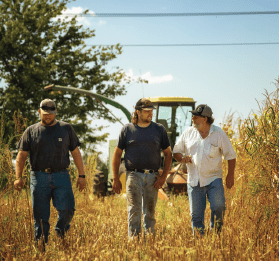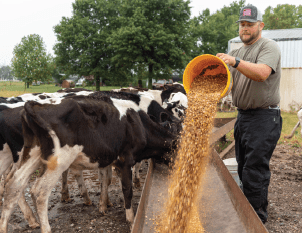When Ryan Anglin took over Triple A Farms in 1972, there were 750 dairies in the county. Today, Ryan estimates there to be just 40 in the entire state, and his 1,500-acre Bentonville farm is surrounded by warehouses, supplier businesses and an expanding global headquarters for one of the largest companies in the world.
Nonetheless, Ryan relishes the fact that his farm, for which he and his family tirelessly raise dairy cows, beef cattle and feed crops, is an agricultural oasis — and he’s quick to point out the value of ag. “Here in the land of Walmart, many are surprised to learn that agriculture, not retail, is Arkansas’ largest business sector.”
As third-generation farmers working with their successors, Ryan has maintained many of the property’s historic amenities, including the farmhouse his mother was born in and the machine shed his grandfather stored the farm’s first tractor in. Yet he’s also embraced change, particularly when it can make a difference in sustainability. Triple A Farms was one of the very first farms in the state to receive an energy audit, and as an outgrowth of that effort, the Anglins installed a plate cooler to pre-chill their milk, along with finding ways to reduce their electricity and repurpose water to wash their barn.

While such developments keep Ryan on his toes, he remains steadfast in his love of the dairy community, including the people, the cows and the ultimate milk product, which in his case, is sold throughout Arkansas.
“Milk is nature’s most perfect food,” he concluded. “When it goes on a truck, I want it to be the very best milk that is humanly possible for me to produce –– and everyone on this farm is responsible in some way for that happening.”
Triple A will celebrate its 100th anniversary in 2022, and Ryan, 65, vows he’ll work long enough to stamp the centennial sign into the ground alongside his wife, Susan, whose mother had been a personal secretary to Sam Walton. While the dairy industry has gone through its ups and downs, the Anglins have been sharp managers, and have built a financial cushion to see them through droughts, economic downturns and other challenges. In order to teach his two sons money management from young ages, Ryan gifted them with their own cows so they could bankroll their needs based on their individual milk checks. The experience paid o , as Cody and Casey have each remained daily fixtures on the family farm.
“The biggest reward is getting up every morning and knowing that I get to work with my two sons,” Ryan stated. “They’re the best crops we ever raised.”
